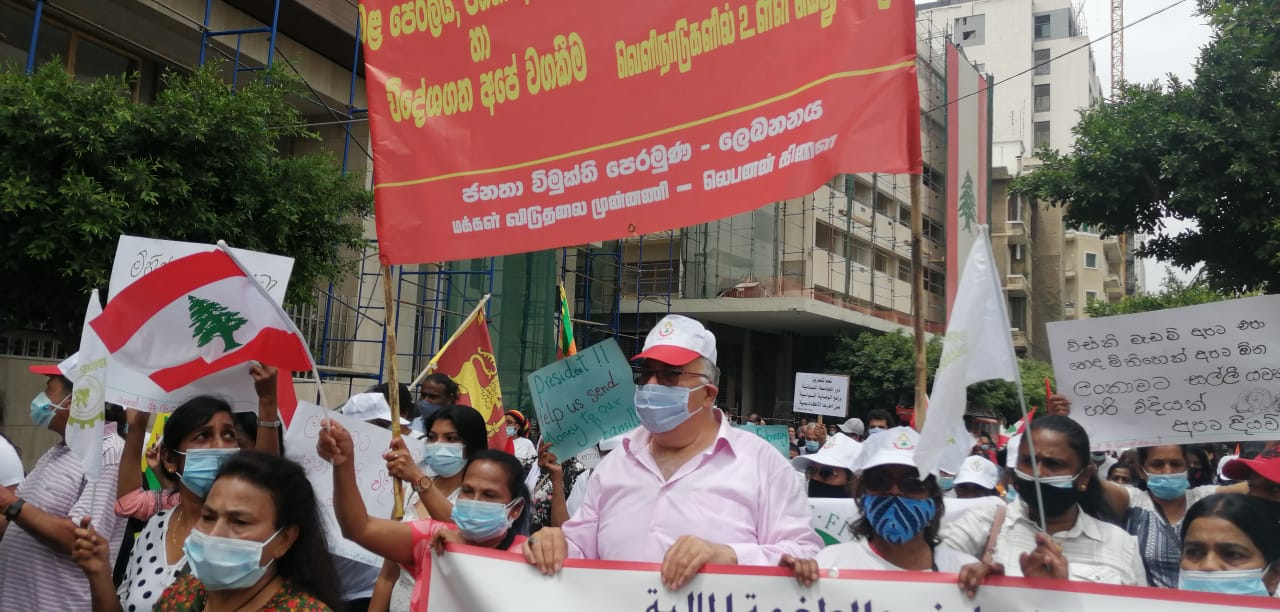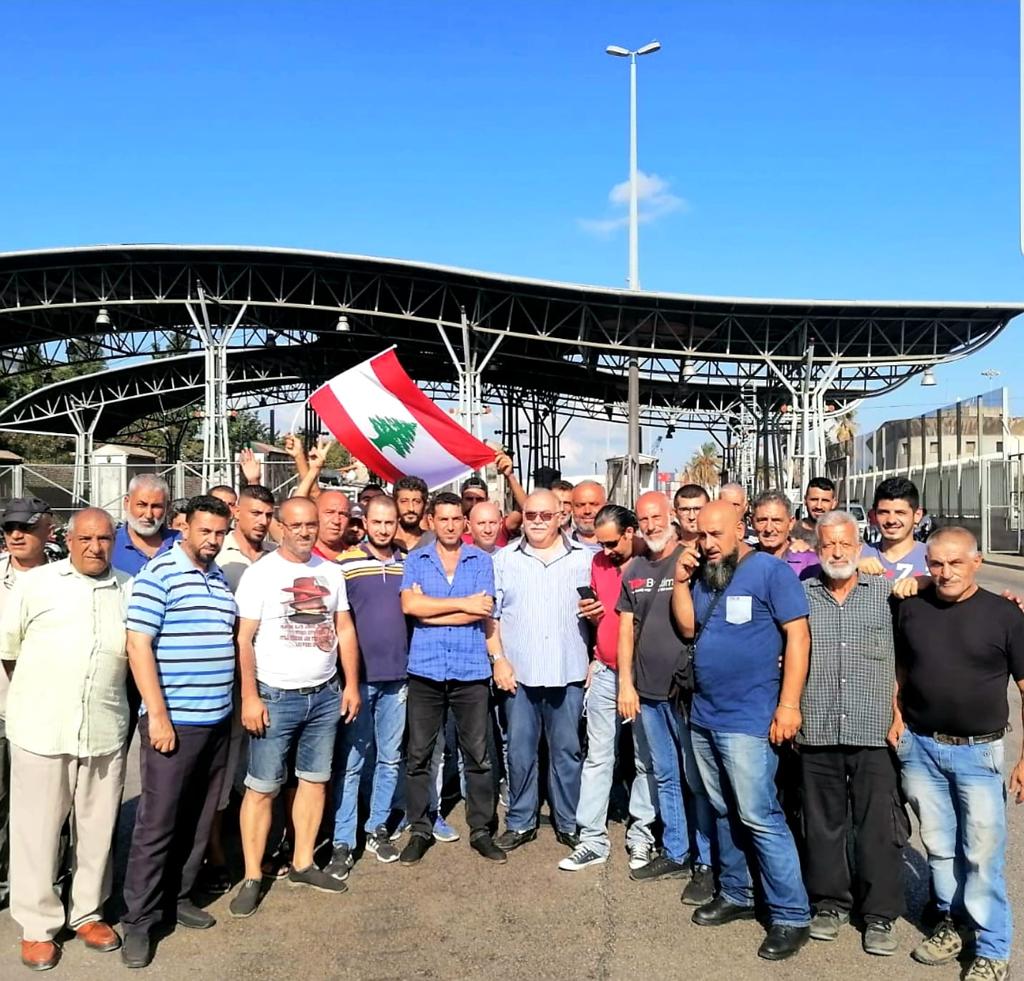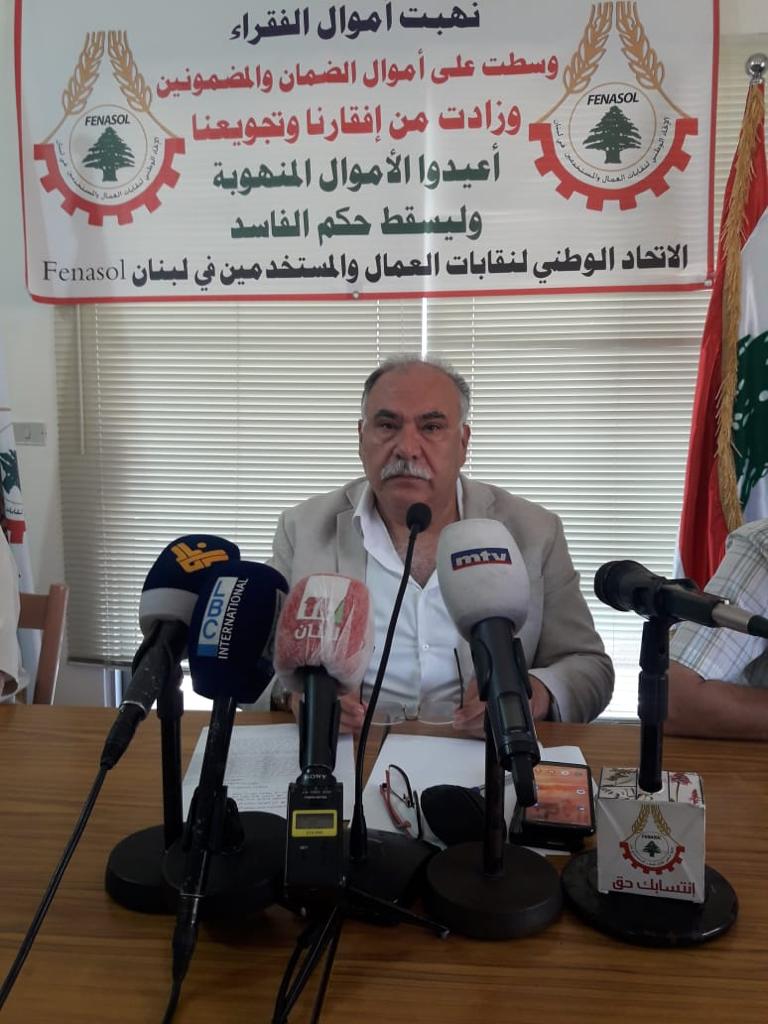Interview with Castro Abdallah, President of FENASOL Lebanon
- What is the situation in Lebanon today, given the pandemic, the big explosion last year and the crisis?
The explosion of the port of Beirut on August 4th, 2020 is one of the most powerful and damaging explosions after the Bombing of Hiroshima. Meanwhile, Lebanon shifted since 1993 to a rentier economy and central bank debt policies. After the uprising and the process of closing banks and seizing people’s money, especially small depositors, money was smuggled from banks abroad in Switzerland and other countries. Following the COVID-19 pandemic, it can be said with confidence, that Lebanon entered the stage of depression accompanied by the disintegrations and dissolution of state institutions, as we notice:
- An inability on behalf of parties to form a government for a period of more than 13 months.
- An almost complete absence of the parliament’s role, with the exception of some formal decisions.
- Security was repeatedly shaken, specifically after the crime of the harbor explosion on August 4, 2020, with more than 225 dead and more than 6000 injured, and the damage of more than 3,000,000 homes, shops, hospitals, institutions and companies, while thousands of workers and employees were dismissed.
- An absence of oversight bodies, an obvious political interference in the judiciary, the spread of the black market for dollar trade, and the growing role of mafia in controlling the market for fuel, electricity, and health. Theft of depositors’ money in banks, and manipulation of dollar prices, which made the dollar jump from 1,500 Lebanese pounds to more than 20,000 Lebanese pounds, with the collapse of the purchasing value of the pound by 95%.
- The exorbitant prices of food, health and basic services commodities such as flour, fuel and medicines in light of the high inflation rates and the public debt ratio to the low GDP. Lebanon is almost no longer producing, and the effects of the quarantine due to the Corona pandemic during the past year and the first quarter of this year were catastrophic for the rest of its economy

- As for this dissolution of the state, it clearly brought to the fore the role of the financial and commercial junta that had, in the past thirty years, ruled Lebanon through an authority that divided the country into sectarian and sectarian protectorates whose aim is not to protect the members of the sects, but rather to exploit fanaticism in order to renew the system every time it arrives to a difficult turning point, which is marked by the collapse of the Taif Agreement, of which very little has been implemented, especially since it was emptied of its content in order to preserve the powers of sectarian leaders, on one hand, and to maintain the system of quotas and the client system of our society which has been prevalent since the birth of Greater Lebanon in 1920, under the neoliberal economic system.
- One of the most evident social phenomena is poverty, as it affects nutrition, limited provision of health and education, and cuts in electricity, gasoline, diesel, water, communications, the Internet, and everything related to infrastructure. The poverty rate in Lebanon increased from 42% to 82% between June 2019 and June 2021, which means that there are more than 4.7 million people out of 5 million are considered poor. The percentage of poor among the elderly increased from 44% to 78%. The proportion of the rich in general is 10% of the total population. As for basic wealth, it is confined to only 1% of the Lebanese.
- One third of Lebanon’s children eat one meal a day.
- The inflation index rose between June 2019 and June 2021 to 281%.
- There is no electricity since July 2021; With the spread of smuggling and the black market, the control of private generators has increased, and there are gangs backed up by the authority, who impose huge prices equivalent to a subscription allowance of only 5 amperes per month for the price of about 1,300,000 pounds, which is more than twice the minimum wage.
- As for health and medicine, the percentage of families deprived of hospitalization has increased today from 9% to 33% which means that a third of the Lebanese people no longer enjoy health coverage in addition to the 55% who were not originally covered by any form of health insurance.
- As for education, it has declined a lot as a result of distance learning that was forced by the Corona pandemic, in light of the power outages and the internet stumbling
- In light of this deteriorating situation, the unemployment rate rose in 2021 to more than 55%, with the percentage among women reaching 71%. While the minimum wage according to the black-market exchange rate has stumbled to less than $35 per month, there is no prospect of correcting wages, salaries and pensions in light of the loss of the right to work and its permanence, and with them the health and social safety net. In addition to the expulsion of more than 70,000 workers from the private sector, especially daily workers and workers in the construction, agricultural and informal sectors
- As far as foreign workers are concerned, more than 130,000 out of 250,000 workers have returned to their country, in addition to Palestinian and Syrian refugee foreign workers.
- Unfortunately, there are many people who live on one meal a day, and many live on aid, although some of them have money, but it is locked up in the banks by the ruling financial oligarchy. Unfortunately, we see that we are in the direction of collapse, people are being humiliated on a daily basis in front of gas stations and gas stations and in front of bakeries and with the winter coming, there are no materials and burners for heating. The latest manifestation of this sectarian political system was the armed conflict with a sectarian trend (Muslim-Christian) that happened in Tayouneh area. That was a miniature picture of the civil war that Lebanon witnessed between the political sectarian parties. This indicates that the confederation issue which the political sectarian parties are hinting for is getting clear.
- What is the situation of FENASOL today?
It is necessary to refer to the uprising of October 17, 2019 that brought down the government of Saad Hariri. This uprising united the majority of the Lebanese people but after Hariri resigned, the attack began on it from all sides, which made an alliance in order to eliminate this popular phenomenon that broke the barrier of silence and fear. The attack was aimed directly at the leftist trade unions, labor and political forces, as they are the most capable of leading this popular movement. The attack came from sporadic sectarian forces, with some forces that had coordinated movements with some embassies and reactionary forces from the right. The attack was directly on the FENASOL groups and unions affiliated with it and on the forces of the left, and we had many wounded among our friends and comrades. We know that the current government (Mikati’s government), which came about as a compromise towards general elections in May 2022 among the ruling parties, the French and the Iranians, and of course with the approval of American imperialism, will not take any reform measures and does not want to do so, because this government comes from the same system that created the general crisis and is knee deep in corruption and is looting public money and the money of depositors in banks, leading the country to bankruptcy with debts of up to more than 120 billion dollars.

- How is this situation affecting the workers in the construction industry?
The situation of construction workers is difficult, especially since this category of workers does not have protection and rights under the law like other groups of workers and suffers from unemployment and lack of health coverage. FENASOL have already launched a call for solidarity and support in order to help the workers affected by the explosion last year and help farmers and the unemployed, especially in light of the economic and social collapse
- How are the relationships between FENASOL and UITBB?
The relationship with UTTB is good. There is a continuous coordination and follow up between us. But because of the deteriorating situation of the working class due to the imperialist attack on it, there is a need to activate this cooperation and establish a cooperation framework, taking into consideration the COVID-19 situation, in order to prevent this collapse and reinforce the working class.
- What are the suggestions by FENASOL to overcome this difficult situation?
We in the National Federation of Trade Unions (FENASOL) see that the priorities for the solution can evolve from three directions:
- The first direction is the political one, as a national program for rescue is needed, and its first steps will be to stop the collapse, return the looted and smuggled public money abroad, and hold those responsible for corruption accountable, which helps to gradually reduce poverty rates by addressing the causes.
- The second direction is economic, and it lies in restoring the wheel of production and supporting the agriculture and industry sectors in particular, in a way that gives greater opportunities to the newcomers in the job market, and helps to gradually absorb the unemployed. This restores the value of waged labor through a new re-evaluation of it, materially and morally.
- The third direction is social, and its first priority is to stop sectarian portioning, reorganize the conditions of basic public services (electricity, health and education) and deliver them to people with limited income at reasonable prices. And stop all forms of discrimination and inequality against citizens and residents.
Therefore, our unions strive in their struggle to reach the adoption of a democratic electoral law based on proportionality, outside of sectarian constraints, the adoption of a unified civil law for personal status instead of sectarian personal status; amending the labor law, eliminating corruption, approving a plan for a productive economy, stabilizing guarantee funds, approving a sliding scale for wages, improving agriculture and industry in accordance with a national vision, plan and programs, eliminating all forms of discrimination against women and building a democratic labor, popular and political union base in order to build a secular democratic homeland.
In conclusion, we need to refer to international union cooperation. Our union addresses all the friendly union forces with thanks for standing with us in the most difficult circumstances, on our side, on the side of our people, our union, and our democratic health, women’s and workers’ organizations, and providing the best possible support for our struggle process through national development and training projects. Our union will never forget your standing by our people’s issues in the struggle for their liberation and their struggle for democratic change. We also support the people of Palestine and their just national cause of return, self-determination, and the establishment of an independent national state with Jerusalem as its capital. And support the peoples’ struggling against all forms of colonialism, occupation and oppression for the sake of national liberation.
Accordingly, we invite you to stand by us, as many labor unions in Europe from Spain and France have previously stood by us, in order to alleviate the crisis for our workers who are in dire need of support for a decent living.
Warm greetings from the Lebanese working class to the working class in Cyprus.
Castro Abdallah, President of the National Confederation of Trade Unions and Employees in Lebanon


